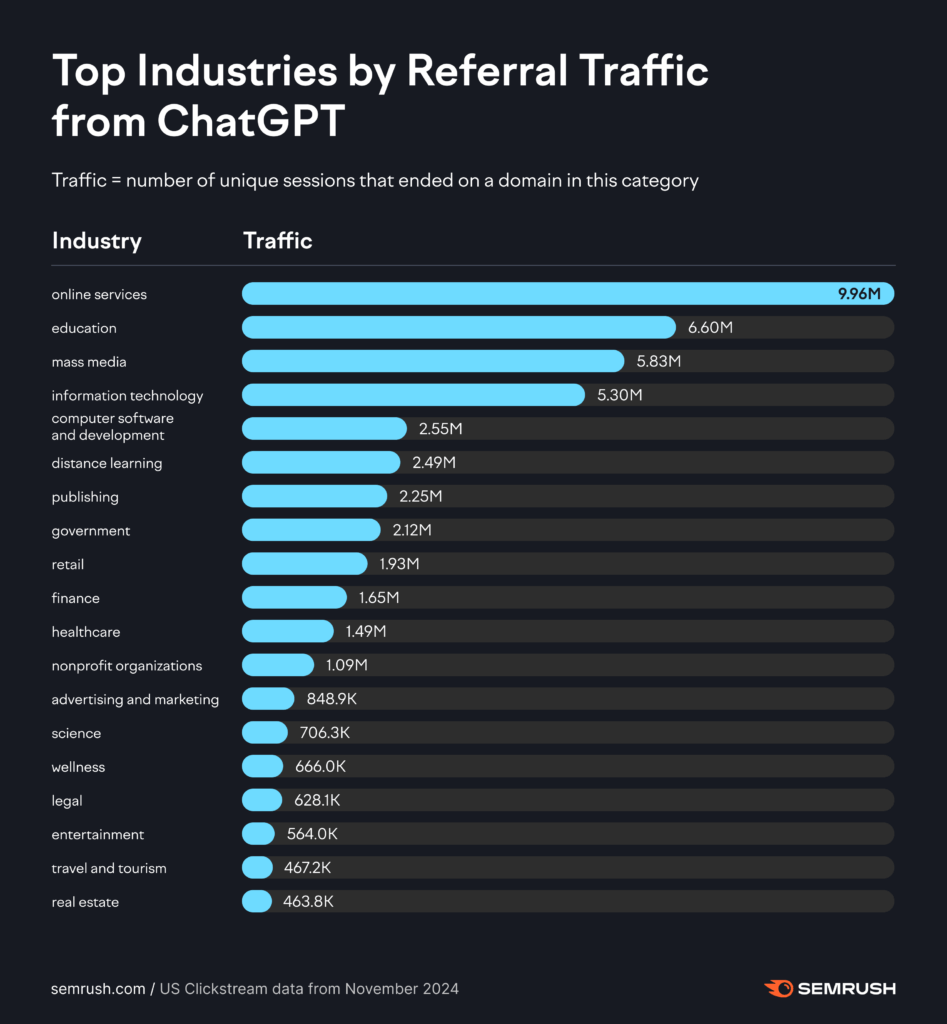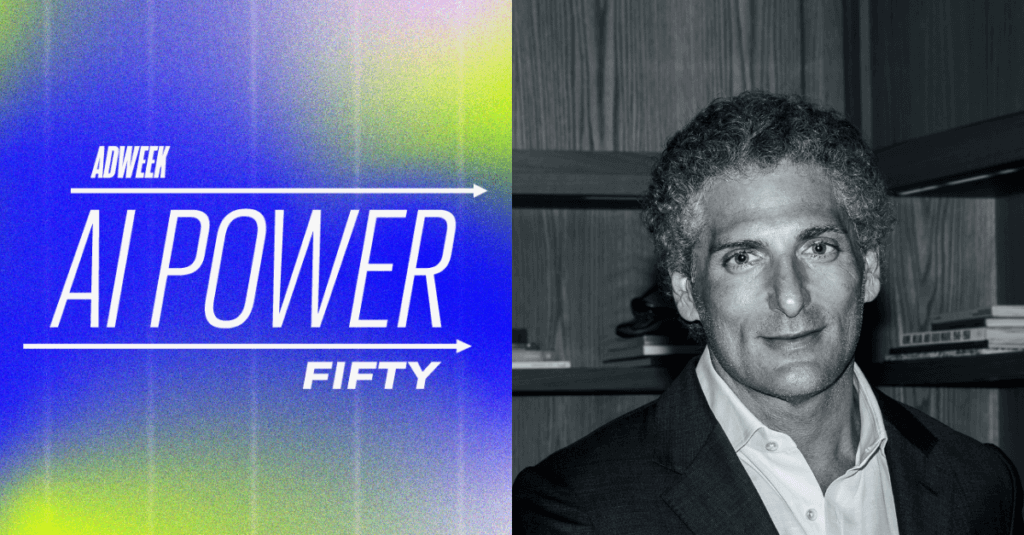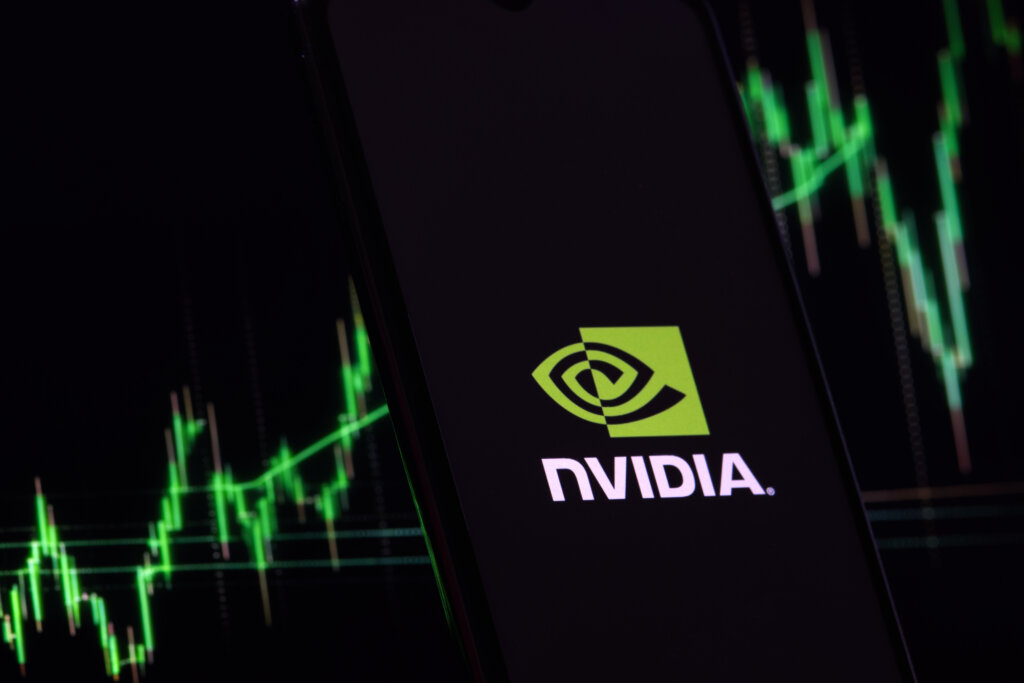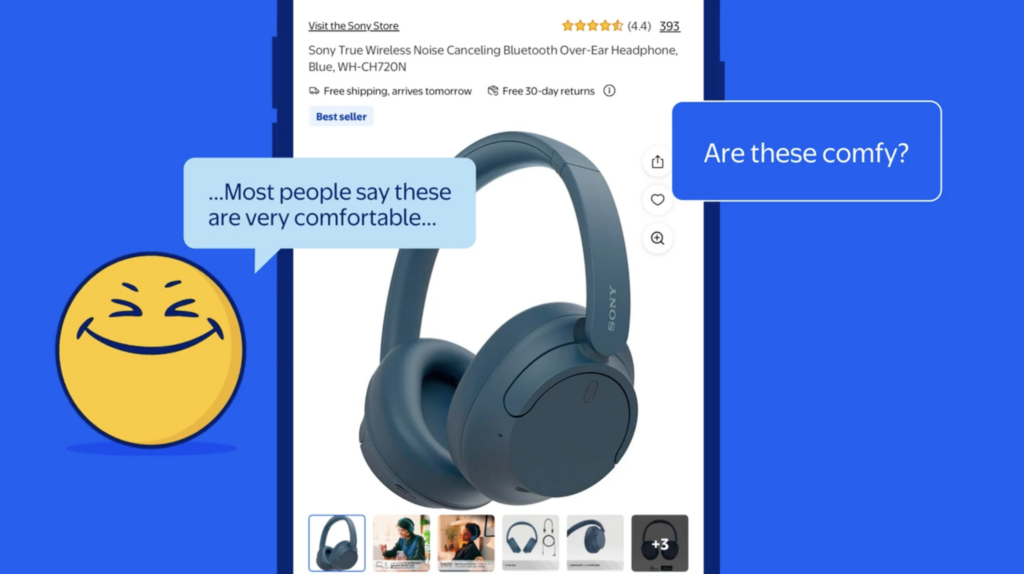For over a decade, Google defined how consumers found answers online. But today, search is being rewritten – not by another blue-link competitor, but by artificial intelligence. Welcome to the era of AI Search, where algorithms don’t just crawl pages – they think, synthesize, and speak back with answers.
Table of Contents
This blog post is based on insights shared in the recent webinar, “What Every CMO Needs to Know About AI Search.” If you’re a marketing leader trying to make sense of the shift, this session breaks down everything you need to understand – from where consumer behavior is heading to how to adapt your marketing, PR, and content strategy.
How to Increase Brand Visibility on ChatGPT
AI-driven search is transforming digital visibility. Learn how to position your brand at the top of ChatGPT and other AI search engines.
The Industries Already Feeling the Shift
AI Search is no longer experimental. It’s already impacting how visibility, traffic, and trust are earned across key sectors. Recent insights from Semrush indicate the industries seeing the most immediate disruption to referral traffic include:

Online Services Industry (9.96B*): From SaaS to subscription platforms, users are using AI to compare tools, solve problems, and skip the click-through process.
- “Best CRM for small business under $50/month”
- “Compare Notion vs Coda for team collaboration”
- “Which email marketing platform has the highest deliverability?”
Education Industry (6.60M*): Students and professionals alike are turning to AI for research, lesson planning, and exam prep – all without visiting traditional education sites.
- “Summarize the causes of World War I for an 8th grader”
- “MCAT study plan for 12 weeks with daily practice”
- “Best online resources to learn statistics fast”
Mass Media Industry (5.83M*): AI models summarize, cite, and link to trusted media – changing how news is consumed and which brands get traffic.
- “What did the NYT say about the 2025 election?”
- “Latest Forbes coverage on startup funding trends”
- “Summarize today’s Wall Street Journal headlines”
IT & Technology Industry (5.30M*): Developers and decision-makers are skipping Google to get direct coding help or tech recommendations from AI.
- “Fix CORS error in Node.js Express app”
- “Compare AWS vs Azure for enterprise migration”
- “What’s the difference between API gateway and load balancer?”
Computer Software and Development Industry (2.55M*): Developers are asking AI to troubleshoot code, optimize stacks, and compare software tools — without opening a single browser tab.
- “How do I fix a memory leak in React?”
- “Best backend frameworks for AI apps”
- “Compare Docker vs Kubernetes vs Podman”
Distance Learning Industry (2.49M*): Learners are skipping course catalogs and asking AI to build custom study paths and recommend certification programs.
- “Best AI certification programs for 2025”
- “Create a 12-week curriculum to learn Python”
- “Top-rated online MBA programs with financial aid”
Publishing Industry (2.25M*): Writers, editors, and readers are turning to AI to summarize books, generate outlines, and source trending content ideas.
- “Summarize ‘Atomic Habits’ in 5 bullet points”
- “Book ideas based on trending topics in psychology”
- “Which publishing houses accept new authors?”
Government (2.12M*): Citizens and researchers are using AI to translate policy, track legislation, and find local services — fast.
- “What does the new SECURE 2.0 Act mean for retirees?”
- “Find local food assistance programs near me”
- “Explain net neutrality like I’m 10”
Retail Industry (1.93M*): Shoppers are using AI to find product comparisons, ethical brands, and personalized gift ideas in seconds.
- “Best sustainable fashion brands under $100”
- “Compare Lululemon vs Alo Yoga for men’s workout gear”
- “AI gift guide for a tech-savvy dad”
Finance Industry (1.65M*): Investors are asking AI for real-time comparisons, market outlooks, and retirement strategies — replacing human advisors.
- “Is a Roth IRA better than a traditional IRA in 2025?”
- “Break down Apple’s 10-K filing”
- “Compare Fidelity vs Vanguard ETFs for long-term growth”
Healthcare Industry (1.49M*): AI is increasingly used for symptom checks, medication advice, and provider searches, threatening referral-based traffic for clinics and platforms.
- “Is my dry cough a sign of allergies or COVID?”
- “What medications interact with ibuprofen?”
- “Find a primary care doctor near me with high reviews”
Non-Profit Organizations (1.09M*): Donors and mission-driven users are using AI to evaluate impact, research causes, and vet organizations.
- “Which charities are most effective for clean water?”
- “Summarize Gates Foundation’s global health initiatives”
- “Best volunteer programs abroad for under $1,000”
Advertising & Marketing (848.9k*): Strategists and founders are leaning on AI for campaign ideas, channel strategy, and performance optimization.
- “Top Generative Engine Optimization agencies”
- “How to structure a full-funnel TikTok campaign”
- “Compare Google Ads vs Meta Ads ROAS by industry”
Science Industry (706.3k*): Researchers are turning to AI to summarize papers, model hypotheses, and explore new disciplines.
- “Explain CRISPR gene editing with real-world examples”
- “What are the latest discoveries in quantum computing?”
- “Summarize this Nature article in layman’s terms”
Health & Wellness (666.0k*): Consumers are using AI to personalize nutrition, explore fitness plans, and decode mental health advice.
- “Best anti-inflammatory foods for joint pain”
- “What’s the difference between mindfulness and meditation?”
- “Design a weekly workout plan with limited equipment”
Legal Industry (628.1k*): People are asking AI to interpret contracts, explain rights, and compare legal services.
- “What does indemnity mean in plain English?”
- “Compare LLC vs S Corp in California”
- “How to draft a freelance agreement with IP protection”
Entertainment Industry (564k*): Fans and creators are using AI to explore plotlines, analyze scripts, and generate ideas for viral content.
- “Summarize Succession season 4 in one paragraph”
- “What makes a screenplay Oscar-worthy?”
- “Top trending TikTok video concepts in 2025”
Travel & Tourism Industry (467.2k): Travelers are using AI to build itineraries, compare destinations, and unlock hidden gems.
- “Plan a 10-day Italy trip with food and art focus”
- “Best boutique hotels in Kyoto under $300”
- “Compare Costa Rica vs Belize for family vacation”
Real Estate (463.8k*): Buyers and investors are turning to AI to evaluate markets, generate listings, and ask questions without agents.
- “Compare Dallas vs Charlotte for real estate investment”
- “What’s the 2025 housing market outlook?”
- “Explain mortgage rate buydown strategies for first-time buyers”
*The figures in this list refer to referral traffic coming from ChatGPT in just 2 months, October to November 2024. In this instance, traffic is defined as the number of unique sessions that ended on a domain in this category. See SEMRush for more information.
Even travel, legal services, and financial planning – industries not traditionally associated with search disruption – are feeling the early tremors.
What’s Actually Happening?
AI Search doesn’t just display a list of links. It delivers synthesized, personalized answers – often citing sources without sending users to them. Even brands ranking #1 on Google might not get seen or clicked if they’re not included in an AI model’s answer set.
Many companies are already watching organic traffic decline and can’t identify why. The culprit? AI is intercepting the attention economy – a trend that’s accelerating rapidly.
Why Traditional SEO Isn’t Enough Anymore
Traditional SEO still matters – but it’s no longer sufficient.
AI Search systems operate with new logic:
- They prioritize thematic relevance, not keyword density.
- They weigh brand authority based on media citations, not backlinks.
- They assess sentiment, clarity, and credibility in how content answers questions.
SEO helped you rank. AI Search helps you become the answer. That requires a whole new strategy.
The Answer: AI Optimization (AIO)
To meet this challenge, CMOs must embrace AI Optimization (AIO) – a new discipline built for this new reality.
AIO ensures your brand is discovered, cited, and trusted in AI-driven environments. It’s a strategic blend of media, content, and technical readiness that increases your brand’s presence across both training data and real-time AI responses.
At Avenue Z, we break AIO into three essential pillars:
- High-Impact Media Placement: AI trusts the sources it’s trained on. Mentions in outlets like Reuters, Forbes, or The Wall Street Journal increase your odds of being cited. This turns PR into a core component of search strategy.
- Strategic Content Development: Conversational queries require conversational answers. AIO prioritizes Q&A content, long-tail queries, and topic clusters to ensure AI understands and includes your brand in its synthesis.
- Technical LLM Optimization: From metadata to content structure, your site must be crawlable and indexable not just by Google, but by large language models. This includes schema markups, structured content, and fine-tuned prompts.
The Metrics Are Already Shifting
Still think this is theoretical? According to Similarweb, referral traffic from ChatGPT alone has grown 300% in just six months. The brands being cited by AI tools are gaining not just visibility – but conversion-ready traffic.
Success metrics are changing:
- AI Share of Voice: How often is your brand cited in AI answers? Want to find out? Request a free AI Visibility Snapshot to find out how your brand is performing in this new search landscape.
- AI Referral Traffic: Are you capturing and measuring visits coming from AI platforms?
- Return on Trust (RoT): Are AI tools portraying your brand as credible and reliable?
This isn’t just about being seen – it’s about becoming trusted in a new ecosystem.
The Opportunity Cost of Waiting
If you remember how Google changed the internet in the early 2000s, you know what’s coming. First movers then became dominant players for decades. The same opportunity – and risk – exists now.
Companies like Chegg, Nerdwallet, and HubSpot are already seeing steep declines in organic traffic from Google, displaced by AI-generated answers. These aren’t isolated cases. They’re signals.
Waiting to act is no longer neutral. It’s a liability.
What You Should Do Today
If you’re in a high-impact industry, here are your next steps:
- Benchmark your brand’s visibility in AI tools like ChatGPT, Gemini, and Perplexity.
- Build a cross-functional AI Search strategy – not just SEO, but PR, content, and web working in lockstep.
- Invest in AIO now to earn early momentum, feed training data, and ensure your presence in live AI results.
👉 [Watch the full webinar] to see how industry leaders are adapting, and request a free AI Visibility Snapshot to find out how your brand is performing in this new search landscape.
How to Increase Brand Visibility on ChatGPT
AI-driven search is transforming digital visibility. Learn how to position your brand at the top of ChatGPT and other AI search engines.






